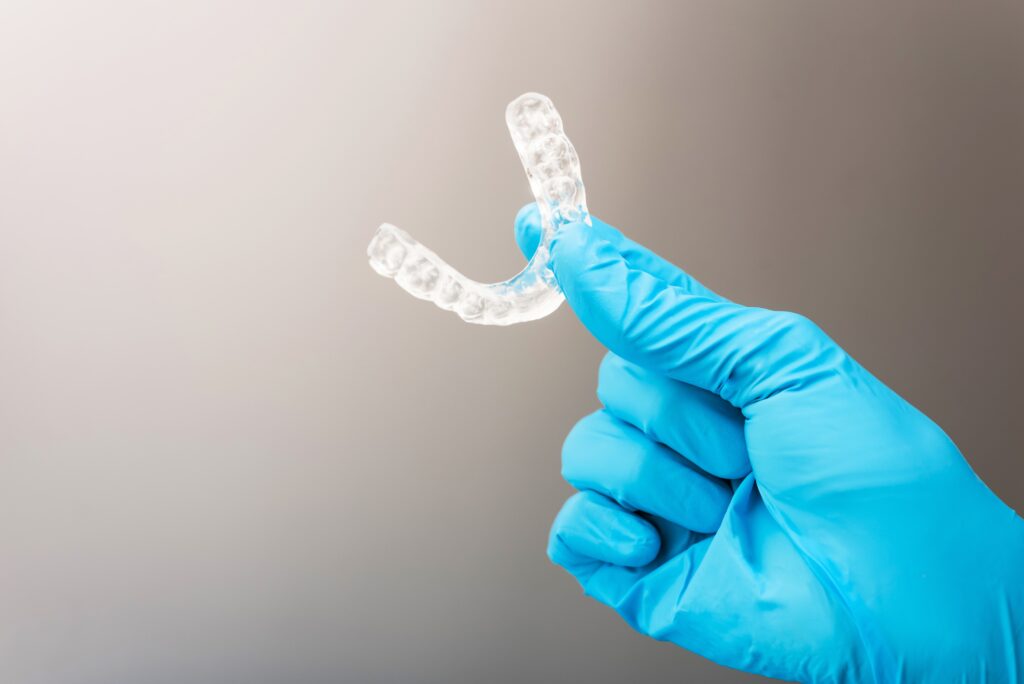Bruxism, better known as teeth grinding, is a widespread problem that affects many people. This medical condition is the unconscious clenching or grinding of the teeth, usually while sleeping. This habit can cause significant damage to the teeth and jaw joint over time. Fortunately, the Cosmedica Dental dental clinic in Turkey offers specialized treatments to help patients with bruxism.
What is bruxism?
Bruxism describes the unconscious grinding or clenching of the teeth. This condition belongs to the group of craniomandibular dysfunctions (CMD). This can occur both during the day (awake bruxism) and at night, although teeth grinding during sleep (sleep bruxism) is more common.
The causes are varied and can have both physical triggers and psychological stress. The most common causes of daily or nightly grinding include stress, anxiety, sleep disorders or misaligned teeth.
Symptoms of bruxism
People suffering from bruxism often only notice the teeth grinding when symptoms have already occurred. The most common symptoms include:
- Jaw pain or muscle tension: The constant tension in the chewing muscles can lead to pain and stiffness.
- Headaches: Recurring headaches, especially in the morning, are a common sign of nighttime teeth grinding. If left untreated, it can lead to chronic pain.
- Teeth wear: The constant rubbing can lead to visible damage such as flattened tooth surfaces or broken teeth. Wedge-shaped defects often remain on the teeth of the upper and lower jaw.
- Sensitive teeth: The wear of the tooth enamel makes the teeth more sensitive to cold, heat and sweet things.
- Jaw noises: Cracking or grinding in the jaw joint when opening and closing the mouth. In some cases, teeth do not come together.
Causes of Bruxism
The exact causes of bruxism are not fully understood, but there are some factors that contribute to its occurrence:
- Stress and anxiety: Stress is considered the main factor in bruxism, as many people unconsciously clench their teeth when under stress.
- Sleep disorders: People with sleep problems such as sleep apnea are more likely to grind their teeth at night.
- Misaligned teeth: Misaligned teeth can also lead to bruxism as the bite is not properly aligned.
- Certain medications: In some cases, bruxism can occur as a side effect of medications, particularly antidepressants.
- Gum: Chewing gum can aggravate bruxism because it overworks the jaw muscles, increasing muscle tension. For those prone to bruxism, frequent gum chewing may worsen symptoms.
Treatment of bruxism at Cosmedica Dental
1. Diagnosis and cause analysis
2. Custom-fitted dental splints

3. Jaw joint therapy
4. Stress management and relaxation techniques
5. Dental aesthetic treatments
At Cosmedica Dental, broken or old teeth can be restored through dental treatments such as veneers in Turkey, crowns or fillings. Dental treatment in Turkey should improve the function and appearance of the teeth. Therefore, you should get regular dental check-ups.
What are the risks of bruxism being left untreated?
Tooth damage
- Enamel wear: The constant rubbing of the teeth leads to excessive abrasion of the enamel. This makes the teeth more susceptible to cavities, cracks and breaks.
- Tooth fractures and chips: With severe bruxism, the teeth can break or chip, leading to costly dental treatment.
- Misalignment of teeth: The constant stress can cause the teeth to shift. This changes the bite and the position of the teeth.
Joint problems
- Pain and tension: Unconscious grinding of teeth can lead to persistent pain in the jaw, face, neck and shoulders.
- Joint pain: Bruxism puts strain on the temporomandibular joint (TMJ), which can lead to inflammation and pain. In severe cases, it can limit jaw mobility.
- Cracking or grinding when opening the mouth: These sounds can be signs of temporomandibular dysfunction (TMD).
Headaches and migraines
- Tension headaches: The constant tension in the jaw muscles often leads to recurring tension headaches, especially after waking up.
- Migraines: In some people, bruxism can also trigger or worsen migraine attacks.
Sleep problems
- Interrupted sleep: People wake up more often, which leads to less restful sleep. Not treating bruxism can make sleep problems even worse for you and your sleeping partner.
- Impairment of quality of life: Sleep problems and pain can impair quality of life. Sleep related movement disorders oder obstructive sleep apnea can lead to increased fatigue, irritability and difficulty concentrating.
Conclusion
Bruxism is a common problem, but it can have serious consequences for the health of permanent teeth. If you grind your teeth at night or have headaches or jaw pain in the morning, come to us. Our team will help you find the cause and a solution so that you can be happy again.
Would you like to learn more about bruxism or make a dentist appointment? Contact Cosmedica Dental and get individual advice!
FAQs - Bruxism
How is bruxism generally diagnosed?
To determine whether someone has bruxism, the dentist first asks about the symptoms and examines the teeth, jaw and mouth. He looks to see whether the teeth are worn, whether there are cracks or whether teeth have broken off. Damage to dentures can also provide clues. The dentist examines the jaw muscles to see whether they are tense, sensitive or hardened.
He can also examine the function of the jaw joints and look at how the jaw opens and closes. He looks for restrictions, pain or unusual movements. Our dentist can recommend a special bite splint that you have to wear for several weeks. The splint shows how much strain is placed on the jaw and whether there are any problems.
Is a night guard uncomfortable?
A night guard is usually not uncomfortable, especially if it is fitted properly. It just takes some getting used to the tooth wear, but the benefits outweigh the disadvantages. If the guard is still not comfortable, you should go to the dentist and have it adjusted.